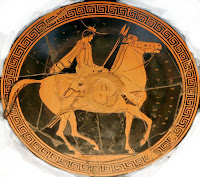Equestrian Polish, Eurasian and the Americas history and horsemanship - from Bronze Age to circa1939AD. Historical equestrian art, my own artwork; reconstructions, and some traditional art media and digital artwork-related topics. All rights reserved unless permitted by 'Dariusz caballeros' aka DarioTW, copyleft or fair use.
Monday, September 27, 2010
Xenophon o horse ridding -fierce and diffcult warhorse
Xenophon - Continuing from chapter VIII:
CHAPTER IX.
How fierce and high-mettled horses are to be managed.
l. The directions which I have given show how a person may best avoid being deceived in purchasing a colt or a fullgrown horse; how he is least likely to spoil him in putting him to use, more especially if he would produce a horse having all the qualities that a horseman requires for war. But perhaps it is now proper to state how a rider, if he ever happen to have a horse excessively fiery, or excessively sluggish, may treat either of them with the most success.
2. In the first place, then, he ought to know that spirit in a horse is what anger is in a man ; and as a person who should neither say nor do anything annoying to a man would be least likely to anger him, so the rider that does nothing to vex a high-spirited horse will be least likely to provoke him.
3. Accordingly he must be careful, even from the very time that he mounts such a horse, not to discompose him as he takes his seat; and when he is fairly seated, he should allow him to stand quiet for a longer time than a horse of ordinary spirit,1 and then direct him to go forward with the gentlest possible intimations. Beginning to proceed, too, at the slowest pace, he should bring him into a quicker one, in such a manner, that the horse may be as little sensible as possible that he is accelerating his course.
4. But whatever a rider requires a spirited horse to do suddenly, the unexpected sights, or sounds, or sensations, consequent upon it, annoy him, as they would annoy a passionate man ; and it is necessary to bear in mind that everything sudden produces perplexity in a horse.
5. If therefore you wish to rein in a spirited horse when he is going faster than is necessary, you must not check him suddenly, but pull him in with the bridle gently, coaxing, and not forcing him, to slacken his pace.
6. Long rides in a direct course, too, soothe horses more than frequent short turnings ; and long gentle rides also soften and tame, and do not exasperate, the high-mettled horse.
7. But if any one imagines that if he rides at a hard pace for a long distance, he will render his horse gentle by fatiguing him, he supposes what is quite contrary to experience ; for a highspirited horse, in such circumstances, uses his utmost endeavours to get the better by force and with anger, like an angry man, and often does irreparable mischief both to himself and to his rider.
s. It is proper also to check a high-mettled horse from galloping at full speed, and to abstain altogether from matching him with other horses ; for horses that grow fond of contending against others become also the most refractory.
9. Smooth bits are more eligible for such a horse than rough. If a rough bit be used, we ought to assimilate it tc a smooth one by keeping it slack.1 It is well, too, for the rider to accustom himself to sit quiet on a fiery-spirited horse, and to touch him as little as possible with anything else2 besides those parts of the body with which we necessarily touch him in order to sit secure.
10. A rider should know, also, that it is a rule to moderate a horse's pace with a sort of whistle, and to urge him forward with a clucking sound; yet that if a person should from the first move him to gentle exertions with a clucking sound, and to more difficult efforts with a whistle, he would learn to quicken his pace at the whistle, and to moderate it at the cluck.
U. Likewise, when a shout is raised, or a trumpet sounded, a person should not appear to a horse to be at all disturbed, or approach him with anything that may alarm him, but should, under such circumstances, use his utmost efforts to pacify him, and, if convenient, should bring him his morning or evening feed.
12. It is a very judicious piece of advice, too, not to purchase a very high-mettled horse for service in war. As to a sluggish horse, it appears to me sufficient to observe, that a rider must treat him in a manner quite contrary to that in which we recommend him to treat a horse of high spirit.
* This observation is most just. It is from the manner of managing them alone that bits are easy or severe to the mouth of the horse; other wise, as the Duke of Newcastle says, the bit-makers would be the best horsemen. Berenger.
' We should not touch him, for instance, with the spear or javelin.
Labels:
Peri Hippikes,
war horse ancient Greece,
xenophon
Subscribe to:
Post Comments (Atom)

No comments:
Post a Comment